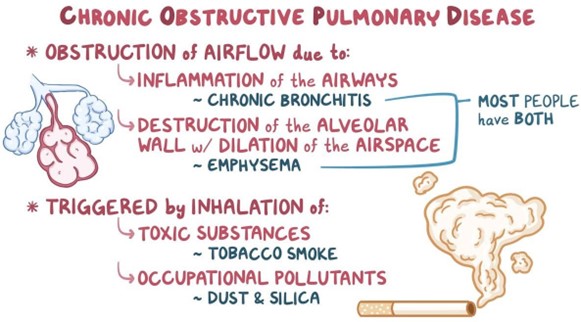The nurse is caring for a client admitted with an acute exacerbation of chronic obstructive pulmonary disease (COPD) who reports a pounding headache. Which action should the nurse take?
Elevate head of bed no higher than 30 degrees.
Affirm blood glucose is below 160 mg/dL (8.88 mmol/L)
Check for a stat intravenous diuretic prescription.
Obtain a manual blood pressure measurement.
The Correct Answer is D
A pounding headache in a client with COPD may be a symptom of increased carbon dioxide (CO2) levels in the blood, known as hypercapnia. Hypercapnia can lead to vasodilation, resulting in headaches. In this situation, it is crucial to assess the client's blood pressure to determine if it is elevated, as this could be contributing to the headache.
Obtaining a manual blood pressure measurement allows for a more accurate assessment of the client's blood pressure compared to automated measurements. It is important to assess both systolic and diastolic blood pressures, as elevated blood pressure can worsen headaches and have other negative effects on the client's health.
Elevating the head of the bed no higher than 30 degrees is a general measure used to improve respiratory function in clients with COPD. However, in this specific situation, it may not directly address the pounding headache. Elevating the head of the bed can help reduce dyspnea and improve oxygenation, but it may not alleviate the headache caused by hypercapnia.
Affirming blood glucose levels are below 160 mg/dL (8.88 mmol/L) is not the primary concern in this case. While high blood glucose levels can have various effects on the body, including headaches, the priority is to assess the client's blood pressure due to the specific context of a COPD exacerbation.
Checking for a stat intravenous diuretic prescription is not necessary in response to the client's headache. Diuretics are typically used to remove excess fluid from the body and may not directly address the underlying cause of the headache in this situation.

Nursing Test Bank
Naxlex Comprehensive Predictor Exams
Related Questions
Correct Answer is B
Explanation
A) Incorrect- While it's important for UAPs to report changes in a client's condition, the immediate priority is to assess and address the deteriorating condition of the client. The nurse's first action should be to stop the current care being provided and assess the client.
B) Correct- In this situation, the priority is to ensure the safety and well-being of the client. The client's deteriorated condition needs to be assessed promptly by a licensed nurse to determine the appropriate interventions. Stopping the care being provided by the unlicensed assistive personnel (UAP) allows the nurse to focus on the client's immediate needs.
C) Incorrect- Administering oral medications is not the immediate priority in this situation. The client's deteriorating condition takes precedence over administering medications.
D) Incorrect- While investigating the situation and addressing communication gaps is important, the first priority is to assess and address the client's current condition. The nurse needs to take immediate action to ensure the client's safety and well-being.
Correct Answer is C
Explanation
In this scenario, the child with a congenital heart defect is presenting with a fever and an
earache. The mother expresses concern about the child's weight and height being at the 5th percentile for his age. Given the child's medical history of a congenital heart defect, it is important for the nurse to address the mother's concerns and provide an accurate response.
The response that states "His smaller size is probably due to the heart disease" is appropriate because children with congenital heart defects may experience growth and developmental delays. Heart defects can affect the child's ability to obtain sufficient nutrients for growth, leading to slower weight and height gain. By acknowledging the relationship between the child's heart disease and his smaller size, the nurse provides the mother with an explanation for the child's growth pattern and helps alleviate concerns.
The other response options are not appropriate or helpful. Asking about the child's mental abilities or implying that the mother has not been feeding the child adequately can be perceived as judgmental or dismissive.
Whether you are a student looking to ace your exams or a practicing nurse seeking to enhance your expertise , our nursing education contents will empower you with the confidence and competence to make a difference in the lives of patients and become a respected leader in the healthcare field.
Visit Naxlex, invest in your future and unlock endless possibilities with our unparalleled nursing education contents today
Report Wrong Answer on the Current Question
Do you disagree with the answer? If yes, what is your expected answer? Explain.
Kindly be descriptive with the issue you are facing.
